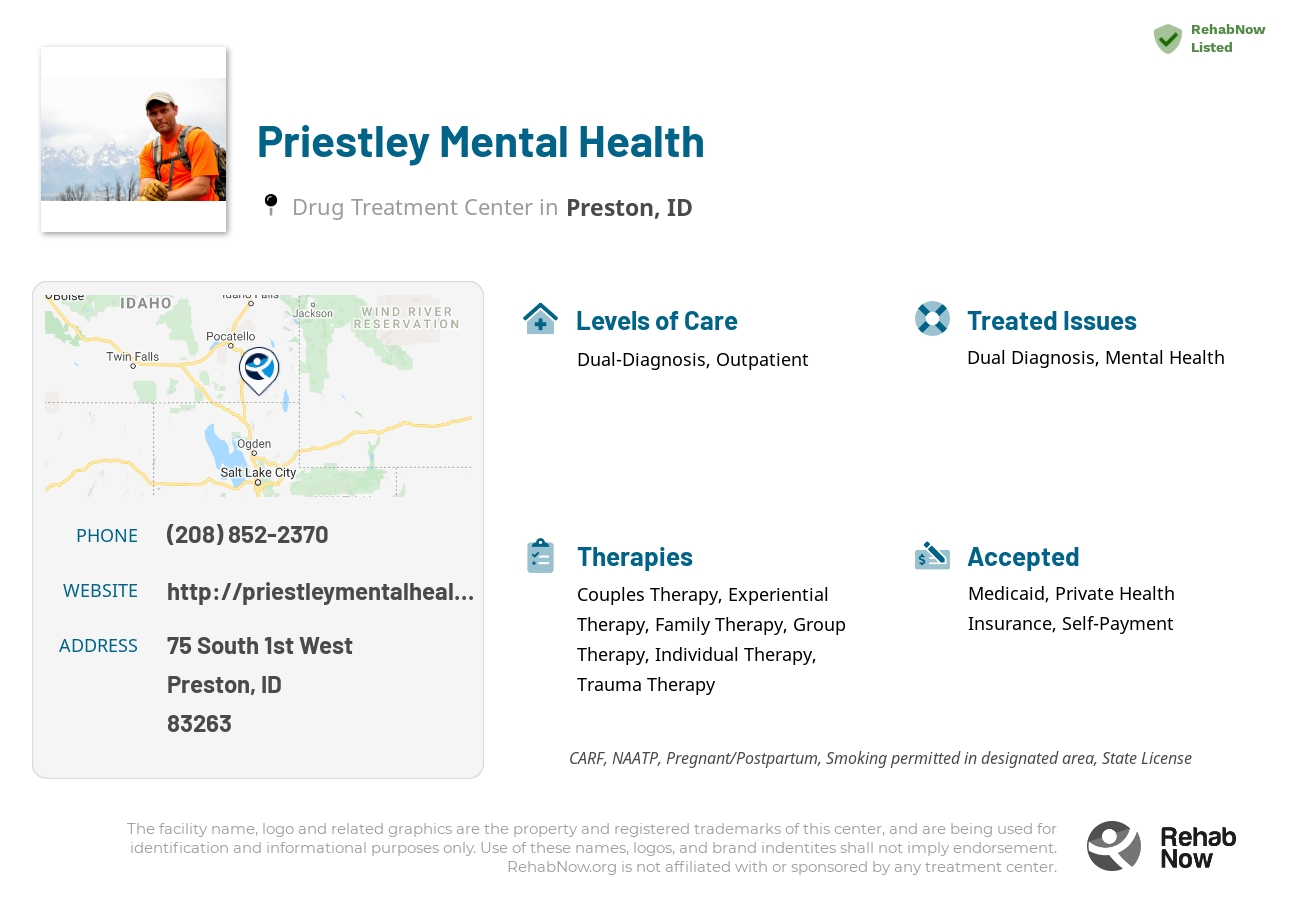
Priestley Mental Health
Drug Rehab Center in Preston, Idaho
- Mental Health
- Dual Diagnosis
Priestley Mental Health is an Idaho-based rehabilitation and treatment center that specializes in treating individuals with dual diagnosis through a variety of therapy services, medication management, and life skill coaching, alongside a range of outpatient services and private health insurance acceptance.
About
Priestley Mental Health is a rehabilitation and treatment center located in Preston, Idaho. It specializes in treating individuals suffering from co-occurring mental health and substance abuse disorders, otherwise known as dual diagnosis. Their treatment plans focus on providing a variety of therapy services, such as family and couples therapy, trauma therapy, cognitive behavioral therapy, and more. In addition, clients are provided with medication management and life skills coaching support to help them develop better coping skills, social relationships, and meaningful life routines.
Furthermore, Priestley Mental Health also provides a variety of outpatient services, such as peer support, case management, and children/adolescent counseling. No matter the individual's needs or situation, they will receive personalized care tailored to help them achieve and maintain their overall mental health and well being. Priestley Mental Health gladly accepts private health insurance and will ensure each client feels respected, valued, and safe in their environment.
Genders
Ages
Modality
Additional
Conditions and Issues Treated
Dual-Diagnosis
A person who struggles with addiction and a mental health condition suffers from a dual diagnosis. This means that they have two issues that must be treated. The specific mental health issues that the patient at Priestley Mental Health might have include but are not limited to:
- Depression
- Bipolar Disorder
- Anxiety
- PTSD (Post Traumatic Stress Disorder)
The specific addiction issues that the patient might have include but are not limited to:
- Alcoholism
- Drug Addiction (i.e., Cocaine, Meth, and other stimulants, Marijuana, and Ecstasy)
The combination of the two illnesses can be tough to treat. Taking care of one or the other is tough, and taking care of both cannot be done alone. A patient who receives dual diagnosis treatment will be given the best chance at becoming sober.
Behavioral Issues, Dual Diagnosis (Co-Occuring Disorders), Emotional Disturbance, Life Skills / Life Coaching, Medication Management, Mental Health, Peer Support
Levels of Care Offered
This center offers a variety of custom treatment tailored to individual recovery. Currently available are Dual-Diagnosis, Outpatient, with additional therapies available as listed below.
Preston, ID Outpatient Program
An outpatient treatment program is set up to help with alcohol or drug addiction or a co-occurring disorder. The treatment must attend the treatment facility for their therapy and other programs but return home each night. The frequency of mandatory attendance decreases after much of the treatment program is complete. The treatment programs are monitored by the treatment facility and case managers who work for a judge or judge’s office. A treatment program may be performed out of a treatment facility, treatment clinic, or treatment center.
The benefits of outpatient treatment programs are many. One of the most beneficial treatment programs is that it allows treatment for clients who cannot afford or may not be able to attend treatment at a treatment facility, treatment center, or treatment clinic full-time. Another benefit of treatment programs is that they reduce crime rates because treatment allows people to treat their addiction.
Therapies & Programs
Individual Therapy
Individualized Treatment is essential because it gives addicts the ability to participate in a program that meets their unique needs. An addict should work with professionals who understand what they’re going through, especially if the addict is actively using. Finding the right treatment program for an addict is difficult, but it’s even harder without communicating with those who have experience treating your specific situation.
Couples Therapy
Couples therapy is a treatment approach where the patients and their partners are engaged together. When a person becomes a victim of substance abuse, it affects the patient and his people, particularly his partner. Their relationship can become strained due to lack of communication, financial issues, loss of trust, lack of intimacy, and physical abuse in more severe cases. Couples therapy addresses these issues and tries to rebuild the trust between the partners. The partner’s involvement in the process will result in greater chances of treatment success and sustained recovery.
Family Counseling
The therapies typically involve all family members, potentially including siblings, children, and parents who play a role in their daily lives. These sessions can be essential because they address past issues that may have affected an addict or alcoholic’s recovery process. They provide support during this time when it is needed most!
A family therapy session, often called a family meeting or intervention, is a necessary process that helps loved ones of addicts see their situation in a new light. It’s also one of the most challenging things families will ever have to do when they’re facing a loved one battling addiction or alcoholism.
Group therapy sessions provide recovering addicts with a chance to cope with everyday situations that many face. Group therapy sessions are held in rehab facilities, clinics, churches or community centers that offer drug addiction treatment.
People who attend these groups are encouraged to voice their feelings and support other addicts in recovery. This helps group members strengthen their own recovery program while cheering on others who are struggling with sobriety.
Trauma therapy allows them to work through past trauma to have peace of mind and begin down the road of sobriety. The therapist will work with the individual to help them understand their past and present relationships. Patients may often believe that something is inherently wrong with them or they are unworthy of love. The therapist aims to correct these negative feelings and behaviors by helping the person realize that their actions do not reflect who they truly are.
Rational Emotional Behavior Therapy (REBT) was developed by Dr. Albert Ellis in 1955. The therapy is based on the premise that our beliefs lead to and maintain our emotions and behaviors. It does not incorporate the use of medications or supplements. Instead, REBT focuses on helping people understand, respect, and accept their feelings without judgment.
Case Management, Children / Adolescent Counseling, Cognitive Behavioral Treatment (CBT), Couples Therapy, Dual-Diagnosis, Experiential Therapy, Family Therapy, Group Therapy, Individual Therapy, Interpersonal, Outpatient Treatment (OP), Residential Long Term (>30 Days), Trauma Therapy
Patient Experience
Experiential Therapy at Priestley Mental Health
Drug addicts can benefit from experiential therapy, which involves real-time activities to process trauma and emotions. This type of therapy is available at Priestley Mental Health and can help reduce the need to resort to drugs and alcohol. Activities may include role-playing, use of props, and others. The individual learns to release suppressed thoughts that lead to negative feelings and embrace the present moment. Experiential therapy is beneficial in treating various disorders, including drug addiction, eating, and behavioral disorders.
Payment Options Accepted
For specific insurance or payment methods please contact us.
Is your insurance accepted?
Ask an expert, call (888) 674-0062
Additional Details
Specifics, location, and helpful extra information.
Preston, Idaho 83263 Phone Number(208) 852-2370 Meta DetailsUpdated November 25, 2023
Staff Verified
Patient Reviews
There are no reviews yet. Be the first one to write one.
Preston, Idaho Addiction Information
In 2010, Idaho ranked amongst the top ten states of substance abuse in several categories. Alcohol dependence and abuse pose a major problem throughout the state, especially among minors between the ages of 12 and 17 years old. Opioids, like everywhere else in the nation, are also responsible for many substance abuse problems in the Gem State.
Treatment in Nearby Cities
- Kuna, ID (249.9 mi.)
- McCall, ID (288.1 mi.)
- Nampa, ID (258.6 mi.)
- Preston, ID (0.2 mi.)
- Moscow, ID (408.4 mi.)
Centers near Priestley Mental Health
The facility name, logo and brand are the property and registered trademarks of Priestley Mental Health, and are being used for identification and informational purposes only. Use of these names, logos and brands shall not imply endorsement. RehabNow.org is not affiliated with or sponsored by Priestley Mental Health.


